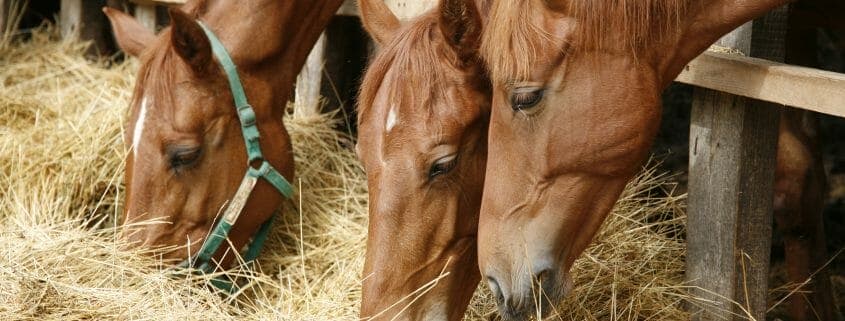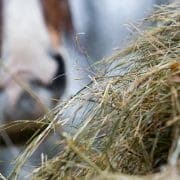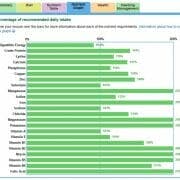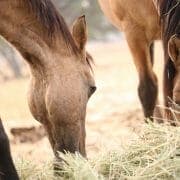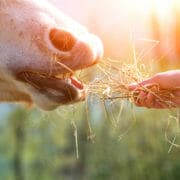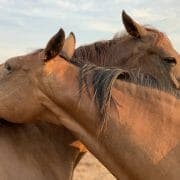Feeding Straw to Horses for Weight Loss
Does feeding horses straw help with weight loss?
Weight loss in easy keepers can seem like an impossible task and is often the cause of frustration for owners, but feeding straw to your horse could be a potential solution. Despite a strict hay only diet, many easy keepers can still maintain their body condition. Owners are also faced with the dilemma of not restricting intake too much (to avoid colic) while trying not to add too much energy to the diet. A study published recently investigated the effectiveness of adding straw to ponies diets to assist with weight loss. The outcomes provide some hope of weight loss for those with easy keepers.
This study looked at 40 native-type ponies at pasture in the UK over winter. The ponies were split into two groups; supplementary fed hay alone or a 50:50 ratio of hay and barley straw. The ponies were weighed regularly over a 4 month period. Over this period, all ponies in the straw fed group lost an average of 27kg. Only 3 of 15 ponies in the hay group lost weight, and overall the group gained weight (average +6kg).
Why feed straw to your horse?
Straw is lower in energy as compared with most grass hays, therefore substituting up to 50% of grass hay in the ration with straw, creates a less energy dense ration whilst maintaining adequate forage intake. This means that intake does not need to be severely restricted to achieve weight loss. In addition, the time horses spend eating per day is extended, which keeps them satisfied and at less risk of gastric ulcers due to prolonged periods without food.
Considering the risk of colic when feeding straw
The addition of straw into diet can be problematic due to the risk of colic. However, in this study there were no reports of colic. Care needs to be taken when choosing the right type of straw, and introduction to the diet should be done gradually over 14-21 days until a 50:50 ratio is achieved with hay to straw.
What type of straw is best for horse feed?
Oaten or barley straw is generally softer (less indigestible fibre) than wheaten straw and is therefore more commonly used for feed. If you have a feed analysis performed, look for an NDF of less than 65. You can also scrunch the straw in your hand to check the coarseness (technical I know!) – you’re feeling that the straw scrunches easily (stems are soft) and the sharp ends don’t prick your palm ie. we want to avoid bedding type straw.
While most straw is low in sugar and starch, a feed analysis to confirm this is a good idea. If a feed analysis is not practical for you, visually inspect the straw to ensure it doesn’t contain intact heads of cereal grains which may make the straw high in starch. Straw will be lower in protein than grass or cereal hays. Therefore, attention should be paid to supplying a good quality protein source within the diet as well as meeting mineral and vitamin requirements.
The difference between straw and hay
Straw vs. hay – for cereal crops, hay is the name given to a crop that is cut for hay when the grain is still maturing. Straw is a by-product which is cut after the plant has matured and the grain has been harvested from the plant.
Reference
Dosi, MCM., Kirton, R., Hallsworth, S., Keen, JA., Morgan, RA. (2020) Inducing weight loss in native ponies: is straw a viable alternative to hay? Veterinary Record Published Online First: 03 May 2020. doi: 10.1136/vr.105793
Meet The Author: Samantha Potter, MSc

In 2009, Sam completed a Bachelor of Equine Studies and it was during this time she developed an interest in equine nutrition. Pursuing this passion, Sam went on to complete her Honours followed by her Masters degree in equine nutrition at The University of Melbourne. Since 2015, Sam has worked as an independent nutritionist and enjoys supporting horse owners manage their horse’s nutrition in her role with FeedXL. To learn more about Sam and to ‘meet’ the rest of the FeedXL team, check out our About Us page here.
Interested in learning more about how to keep your easy keeper happy and healthy? Check out our blog on What to Feed an Easy Keeper (feedxl.com)
Do you have a question or comment? Do you need help with feeding?
We would love to welcome you to our FeedXL Horse Nutrition Facebook Group. Ask questions and have them answered by PhD and Masters qualified equine nutritionists and spend time with like-minded horse owners. It’s free!
Click here to join the FeedXL Horse Nutrition Facebook Group

